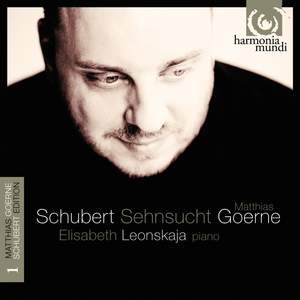Schubert Lieder Volume 1: Sehnsucht
Matthias Goerne (baritone) & Elisabeth Leonskaja (piano)
Goerne's renowned breath control … creates the hushed legato which is his hallmarl. This comes into its own in the Mayrhofer and Leitner settings, creating the mesmeric lilt of water and of... — More…
-
Gramophone MagazineMay 2008Editor's Choice
Downloads
What are FLAC and MP3?Contents
Schubert: Fahrt zum Hades, D526 (Mayrhofer)
- Elisabeth Leonskaja, Matthias Goerne
Schubert: Freiwilliges Versinken D700 (Mayrhofer)
- Elisabeth Leonskaja, Matthias Goerne
Schubert: Das Weinen, D. 926
- Elisabeth Leonskaja, Matthias Goerne
Schubert: Des Fischers Liebesgluck, D933 (Leitner)
- Elisabeth Leonskaja, Matthias Goerne
Schubert: Der Winterabend (Es ist so still), D938
- Matthias Goerne, Elisabeth Leonskaja
Schubert: Memnon, D541 (Mayrhofer)
- Matthias Goerne, Elisabeth Leonskaja
Schubert: Lied eines Schiffers an die Dioskuren D360 (Mayrhofer)
- Elisabeth Leonskaja, Matthias Goerne
Schubert: Der Schiffer, D536 (Mayrhofer)
- Elisabeth Leonskaja, Matthias Goerne
Schubert: Sehnsucht, D. 636
- Matthias Goerne, Elisabeth Leonskaja
Schubert: Der Jüngling am Bache D638
- Elisabeth Leonskaja, Matthias Goerne
Schubert: An Emma, D113
- Elisabeth Leonskaja, Matthias Goerne
Schubert: Der Pilgrim, D.794: Der Pilgrim, D. 794
- Matthias Goerne, Elisabeth Leonskaja
Schubert: Gruppe aus dem Tartarus, second version, D583 (Schiller)
- Matthias Goerne, Elisabeth Leonskaja
Schubert: Hoffnung, D295
- Elisabeth Leonskaja, Matthias Goerne
Schubert: Grenzen der Menschheit, D716
- Elisabeth Leonskaja, Matthias Goerne






